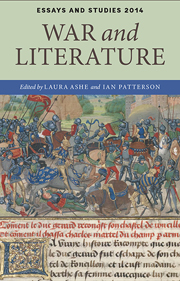Book contents
- Frontmatter
- Contents
- List of Illustrations
- Notes on Contributors
- Preface
- I IDEOLOGIES
- II INTERPRETATIONS
- Crossing the Rubicon: History, Authority and Civil War in Twelfth-Century England
- ‘The Reader myghte lamente’: The sieges of Calais (1346) and Rouen (1418) in chronicle, poem and play
- Shakespeare's Casus Belly; or, Cormorant War, and the Wasting of Men on Shakespeare's Stage; or, Eating Wars and Digesting Plays; or, The Art of Chucking Men Into Pits; or, Shakespeare, Tacitism, and Why Plato Don't Matter
- Unnavigable Kinship in a Time of Conflict: Loyalist Calligraphies, Sovereign Power and the ‘Muckle Honor’ of Elizabeth Murray Inman
- Proclaiming the War News: Richard Caton Woodville and Herman Melville
- III AFTERMATHS
- Index
Shakespeare's Casus Belly; or, Cormorant War, and the Wasting of Men on Shakespeare's Stage; or, Eating Wars and Digesting Plays; or, The Art of Chucking Men Into Pits; or, Shakespeare, Tacitism, and Why Plato Don't Matter
from II - INTERPRETATIONS
Published online by Cambridge University Press: 05 October 2014
- Frontmatter
- Contents
- List of Illustrations
- Notes on Contributors
- Preface
- I IDEOLOGIES
- II INTERPRETATIONS
- Crossing the Rubicon: History, Authority and Civil War in Twelfth-Century England
- ‘The Reader myghte lamente’: The sieges of Calais (1346) and Rouen (1418) in chronicle, poem and play
- Shakespeare's Casus Belly; or, Cormorant War, and the Wasting of Men on Shakespeare's Stage; or, Eating Wars and Digesting Plays; or, The Art of Chucking Men Into Pits; or, Shakespeare, Tacitism, and Why Plato Don't Matter
- Unnavigable Kinship in a Time of Conflict: Loyalist Calligraphies, Sovereign Power and the ‘Muckle Honor’ of Elizabeth Murray Inman
- Proclaiming the War News: Richard Caton Woodville and Herman Melville
- III AFTERMATHS
- Index
Summary
If this be magic, let it be an art
Lawful as eating.
In april 1581, Arthur Lord Grey of Wilton, then Lord Deputy of Ireland, wrote to Sir Francis Walsingham to report on the state of his administration in Dublin. Grey's main concern in the spring of 1581 was the restive Irish lords and septs around the Pale, and especially the dangerous Feagh McHugh O'Byrne, lord of Ballinecor in the Wicklow mountains. Grey reported to Walsingham that two of his captains in the Irish service, Sir William Stanley and Captain William Russell, had recently raided Feagh McHugh's stronghold, and burned it, ‘kyll[ing] certayne of hys kerne & churles, withowte the loss or hurtt of any of owres’. In addition to this good ‘service’, as it was known in the official dispatches of the period, Grey commended the business of another of his captains, Humphey MacWorth, who ‘hathe within this moonethe space putt too swoorde & executed very neere a hundrethe of the best of the Omoores, so as the rest of the sept hathe putt in pledge for theyr peacyble & good beehauior’. The contrast with Stanley and Russell's service is clear; they had killed some kerns and churls, but MacWorth executed a great number of the ‘best’ of one of the most dangerous septs bordering on the Pale. ‘This man certaynely dezerues greate estimation not onely for valure but goouernment,’ wrote Grey, ‘enter hym therfore I praye yow into yowr Cataloge of well deseruers.’
- Type
- Chapter
- Information
- War and Literature , pp. 107 - 138Publisher: Boydell & BrewerPrint publication year: 2014



